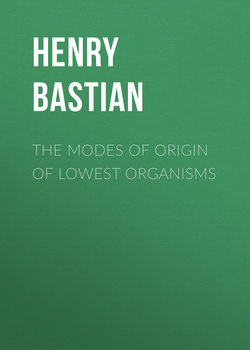Читать книгу The modes of origin of lowest organisms - Bastian Henry Charlton - Страница 2
THE MODES OF ORIGIN
OF
LOWEST ORGANISMS
ОглавлениеThe mode of origin of Bacteria, and, to a less extent, of Torulæ, has been much discussed of late, and many different views have been advocated on this subject by successive writers.
It is of much importance to bear in mind when such views are under consideration, that a short time since nothing was positively known concerning the life-history of these organisms. However strongly, therefore, certain persons are inclined to rely upon the analogy which is supposed to obtain between these doubtful cases, and the multitudes of known cases – in which it can be shown that organisms are the offspring of pre-existing organisms – it must always be borne in mind that in many of the doubtful cases, where the simplest organisms are concerned, there is also an analogical argument of almost equal weight adducible in favour of their de novo origination – after a fashion, and under the influence of laws similar to those by which crystals arise. To rely too exclusively upon an argument from analogy is always perilous: it is more than usually so, however, in a case like this, where what is practically an opposing analogy may be deemed to speak just as authoritatively in an opposite direction.
There is one consideration, moreover, which deserves to be pointed out here, and which does not seem to have occurred to most of those who so firmly pin their faith to the truth of the motto “omne vivum ex vivo.” The every-day experience of mankind, supplemented by the ordinary observations of skilled naturalists, does pretty fairly entitle us to arrive at a wide generalization, to the effect that some representatives of every kind of organism are capable of reproducing similar organisms. But, whilst this is all that the actual every-day experience of mankind warrants being said, and whilst there is in reality the widest possible gulf between such a generalization and that which is expressed by the motto “omne vivum ex vivo,” the latter formula has of late been spoken of as though it were the one which was in accordance with the daily experience of mankind, rather than the other, which gives expression to a generalization of a much narrower description. This experience, in reality, affords no evidence which could entitle us to place implicit belief in the formula “omne vivum ex vivo.”
Whilst we do know something about the ability which most organisms possess of reproducing similar organisms, we cannot possibly say, from direct observation, that every organism which exists has had a similar mode of origin, because the cases in which organisms may have originated de novo are the very cases in which their mode of origin must elude our actual observation. Such a statement, too, would be all the more dangerous, in the face of the other analogy, when it can actually be shown that some organisms do make their appearance in fluids after precisely the same fashion as crystals.
Although, therefore, there is a contradiction between the unwarrantable and ill-begotten formula, “omne vivum ex vivo,” and the doctrines of what has been called “Spontaneous Generation”; there is no contradiction whatever between such doctrines and the only generalization which we are really warranted in arriving at, to the effect that some representatives of every kind of organism are capable of reproducing similar organisms.
Bacteria, Torulæ, or other living things which may have been evolved de novo, when so evolved, multiply and reproduce just as freely as organisms that have been derived from parents.
The views as to the origin of Bacteria and Torulæ which are most worthy of attention, may be thus enumerated: —
a. That they are independent organisms derived by fission or gemmation from pre-existing Bacteria and Torulæ.
b. That they represent subordinate stages in the life-history of other organisms (fungi), from some portion of which they have derived their origin, and into which they again tend to develop.
c. That they may have a heterogeneous mode of origin, owing to the more complete individualization of minute particles of living matter entering into the composition of higher organisms, both animal and vegetal.
d. That they may arise de novo in certain fluids containing organic matter, independently of pre-existing living things (Archebiosis).
I shall make some remarks concerning each of these views, though the evidence I have to adduce mainly concerns the possibility of the origin of Bacteria and Torulæ in the way last alluded to, viz., by Archebiosis.
The third mode of origin is what is called Heterogenesis; whilst the first and second modes are the representatives of more familiar processes, included under the head of Homogenesis. Thus, in accordance with the first view, Bacteria may be regarded as low organisms having a distinct individuality of their own and multiplying by a process of fission – thus affording instances of what I propose to term direct Homogenesis. Whilst, in accordance with the second view, Bacteria are supposed to represent merely one stage in the life-history of higher organisms, which are therefore reproduced by an indirect or cyclical process of Homogenesis.
The possible modes of origin of Bacteria and Torulæ may, therefore, be tabulated as follows: —
